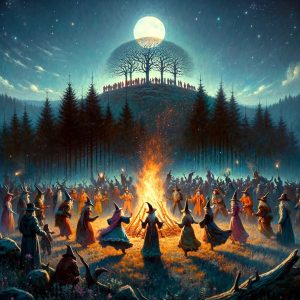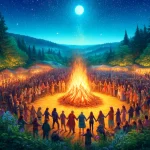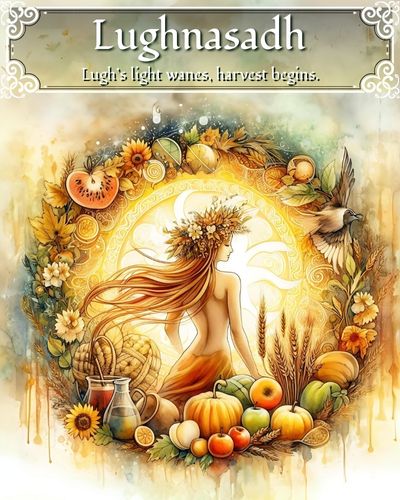
Approx. Reading time: About 16 Minutes

Introduction
Unraveling the Twelve Days of Yule
In the quiet hush of winter’s embrace, as the world settles into a celestial stillness, a sacred journey unfolds – the Twelve Days of Yule. Rooted in ancient pagan traditions and embraced by modern practitioners, Yule, a festival spanning from December 20th (Mother’s Night) to January 1st (Yule Night), marks a profound passage through the solstice, the rebirth of the Sun, and the intricate dance of divine energies. These twelve days, each carrying a unique resonance, invite us to step into the mystical spiral of Yuletide – a tapestry woven with threads of ancient myths, celestial alignments, and timeless traditions. As we embark on this journey, we traverse the realms of myth and magic, honoring deities, ancestors, and the ever-turning Wheel of the Year. Join us on this sacred pilgrimage through the Twelve Days of Yule, where the old and the new converge in celebration that transcends time.

A Resonance from Ancient Corridors to the Modern Hearth
In the quiet depths of winter, where the air sparkles with frost and the world cradles itself in a blanket of snow, there emerges a festival that transcends time—the sacred Yuletide. As we tread through the hallowed echoes of ancient tongues, the Old English words ġēol or ġēohol whisper through the corridors of history, bringing with them the profound significance of Yule.
A Tapestry Woven in Time
Yule, with roots shrouded in the mists of antiquity, stands as a testament to the enduring spirit of celebration. The very utterance of ġēol or ġēohol evokes a resonance that travels across the ages, a linguistic bridge connecting us to the festivities of yore. This timeless festival unfolds like a delicate dance, spanning approximately 12 days and carrying within its embrace the sacred journey through the winter solstice.
Winter’s Solace, Sun’s Rebirth
In the heart of Yule, a celestial ballet unfolds, choreographed by the cosmos itself. At the nexus of this sacred festival lies the enchanting winter solstice, a celestial event that paints the world in the hues of mystery and renewal. As the Earth tilts towards its furthest point from the sun, plunging into the depths of winter’s embrace, Yuletide emerges as a luminous thread, delicately weaving through the longest night.
The Old English words, ġēol or ġēohol, resonate with the whispers of our ancestors, those wise souls who dwelled in the hush of winter’s solace. In the stillness of this season, they found solace not in the darkness itself but in the promiseit held—the promise of the Sun’s rebirth. Yule, as a festival, is a ceremonial acknowledgment of this celestial turning point, marking the moment when darkness begins its graceful retreat, yielding to the gradual return of the light.
Imagine the scene: the world enveloped in a wintry stillness, the night stretching its inky fingers across the landscape. In this cosmic theater, Yule takes center stage. The longest night, bathed in the soft glow of moonlight and starshine, becomes a canvas for the age-old drama of light and shadow. Yuletide, like a skilled conductor, orchestrates the dance of the celestial bodies, inviting us to witness the rebirth of the Sun.
As the solstice dawns, the darkness that had claimed its temporary dominion begins to recede. Yule, with its roots embedded in the ancient fabric of time, becomes a beacon of hope. The turning of the cosmic wheel is palpable—a moment when the pendulum swings, and the balance shifts. The Sun, having reached its nadir, now heralds its triumphant return, promising longer days, the thawing of winter’s chill, and the awakening of the dormant earth.
Yule, therefore, is more than a festival; it is a profound acknowledgment of the cyclical nature of existence. It’s a recognition that in the ebb and flow of light and dark, life and death, we find the rhythm of our own journey. The Old English words, resonating across the ages, remind us that our ancestors, too, stood on the cusp of winter, gazing towards the heavens with reverence, celebrating the cosmic spectacle that marked the turning of the year.
So, in the heart of Yule, let us embrace the celestial ballet, where the world pirouettes from darkness to light. In this sacred dance, Yuletide becomes a luminous thread stitching together the tapestry of seasons, a testament to the eternal cycles that bind us to the cosmos.
A Dance with the Divine
Yule, with its ethereal charm, extends an invitation not merely to a temporal celebration but to a profound dance with the divine. Picture the scene: the flickering glow of hearth fires casting a warm embrace, candles shimmering like stars in the velvety darkness. In this enchanted ambiance, Yule transcends the boundaries of a mere festival; it becomes a sacred choreography, a dance with the divine that echoes through the ages.
In the hallowed halls of Yule, ancient practitioners found themselves immersed in a sacred communion with the divine. Unlike a distant, aloof force, the divine manifested itself in the very fabric of nature’s intricate cycles. It was immanent in the rhythmic dance of the seasons, the celestial bodies tracing their arcs across the night sky, and in the pulsating heartbeat of life itself.
The hearth, aglow with the warmth of Yule fires, became an altar where the mundane met the sacred. As practitioners gathered in the circle of firelight, they weren’t merely celebrating the turning of the year; they were participating in a cosmic ballet. Each flame, a microcosm of the sun’s rebirth, carried the essence of the divine into the hearts of those who bore witness.
Candles, strategically placed to illuminate the shadows, were not mere sources of light; they were symbols of the eternal flame that resides within every being. The shimmering glow reflected not just the dance of fire but the dance of life, a dance intimately entwined with the divine energies that flowed through the universe.
The cycles of nature, revered during Yule, were seen as a divine tapestry woven by unseen hands. The waxing and waning of the moon, the ever-turning wheel of the seasons, and the cosmic ballet of planets and stars—all were recognized as celestial signatures of a divine presence. Yule, therefore, was a time when practitioners acknowledged their place within this grand choreography, becoming active participants in the divine play.
In this dance with the divine, Yule spoke a language older than words, a language understood not through intellect alone but through the beating of hearts attuned to the cosmic rhythms. It was a celebration where the mundane and the sacred intermingled, where the hearth became an altar, and the flickering flames whispered secrets of the divine mysteries.
As we embrace Yule today, let us step into this sacred dance with reverence. Let the flicker of candles and the warmth of hearth fires remind us that, like our ancestors, we are woven into the cosmic fabric. In the dance of Yule, the divine is not a distant concept but a pulsating reality, and as we twirl through the sacred steps, we echo the eternal rhythm of the divine dance.
The Twelve-Day Journey
Embarking on a mystical odyssey that spans approximately 12 days, Yuletide unfurls like a sacred scroll, each day etching its own mark upon the cosmic tapestry. This journey through time and tradition, from Mother’s Night to the crescendo of Yule Night, is a profound exploration of the interconnectedness between the earthly and the divine.
- Mother’s Night (Dec 20th): The pilgrimage commences with Mother’s Night, a sacred homage to protective female spirits and the ancestral feminine energy that weaves through the lineage of time. As candles flicker in reverence, practitioners honor the Disir, those ethereal guardians of fate and fertility. In this gentle dance of gratitude, the spirits of female ancestors are invoked, and the circle of feminine power is acknowledged as the foundation upon which the Yuletide celebration stands.
- Winter Solstice (Dec 21st): At the heart of this celestial journey lies the Winter Solstice, a day that aligns with the cosmic turning point. The world, veiled in the darkest embrace of winter, witnesses the rebirth of the Sun. As practitioners gather in the glow of Yule fires, they honor Sunna and Mani, weaving their energies into the luminous fabric of the returning light. The longest night is met with a celebration of hope, marking the promise of lengthening days and the triumph of light over darkness.
- Father’s Night (Dec 22nd): The odyssey then turns to Father’s Night, a sacred eve dedicated to honoring the male spirits that guard and guide. The Alfar, embodiments of male ancestors and nature’s potent forces, are recognized and venerated. Like a silent forest breeze, the energies of Freyr and his boar permeate the night, and practitioners stand in the shadow of masculine protection.
- Count the Blessings (Dec 23rd): As the tapestry unfolds, the third day beckons practitioners to count their blessings. Loki and Sigyn, symbolic of unconventional celebrations and the turning of social norms, preside over this day. Gifts are exchanged, disguises worn, and the Yule Tree is erected, adorned with symbols of gratitude and joy.
- The Wild Hunt (Dec 24th): On the fourth day, the ethereal Wild Hunt takes center stage. Led by Odin and Frau Holda, this ghostly parade of spirits rides through the night, capturing the essence of ancestral rites. The Wild Hunt symbolizes the untamed forces of nature and the cyclical dance between life and death, marking a moment of reflection on the eternal cycle.
- Protecting the Home (Dec 25th): December 25th arrives, heralding a day to protect the home. Balder and Nanna, embodiments of light and hope, guide the festivities. Homes are adorned with candles, ribbons, and the Yule Tree. Mistletoe, blessed for protection, hangs in doorways, invoking blessings for the coming year. This day marks a symbolic letting in of light and hope, a gesture of resilience in the face of the winter’s chill.
- Hospitality and Greeting the Depth of Winter (Dec 26th): As the cosmic journey progresses, the sixth day is dedicated to hospitality and greeting the depth of winter. Kari and his kin, symbolic of the chilling winds, preside over this gathering. It’s a day for feasts, particularly lamb stew and leaf bread, as kin gather to share warmth and nourishment before the winter’s grip tightens.
- Protecting Outside the Home (Dec 27th): Turning attention beyond the hearth, December 27th becomes a day of protection outside the home. Skadi and Ullr, guardians of the wild and the wintry depths, oversee offerings to the spirits of the woods, wild birds, and animals. This day is also marked by the creation of protective wards for the coming winter, ensuring a shield against unseen forces.
- Begin Tiding Up for the New Year (Dec 28th): The eighth day beckons practitioners to begin tidying up for the new year. Njordr and Nerthus, embodiments of prosperity and fertile lands, guide this day. It’s a time to conclude tasks left undone, a moment of closure and preparation for the impending new cycle. As the year draws to a close, plum pudding becomes a culinary symbol of completion.
- Looking into the New Year, Enjoying Nature (Dec 29th): Approaching the year’s end, the penultimate day invites a gaze into the future and an appreciation of nature’s wonders. Freyja, the embodiment of love and beauty, presides over this contemplative day. Practitioners create open spaces for relaxation, meditate on the year to come, and engage with preferred divination tools, seeking insights for the unfolding future.
- Good Luck into the Coming Year (Dec 30th): As the twelfth day draws near, the focus turns to ushering good luck into the coming year. Idunn and Bragi, symbols of rejuvenation and inspiration, guide this day. Wassail is made, and songs are sung to bless a chosen fruit tree for fertility and good fortune in the impending year.
- Spiritually and Physically Cleanse the House (Dec 31st): The grand finale, the last day of Yule and the year, is dedicated to spiritual and physical cleansing. Porr and Sif, embodiments of strength and familial bonds, preside over this day. Homes are blessed for protection, and the last vestiges of wandering Yule spirits are ushered out. It’s a time for divination spreads, casting light upon the path that lies ahead as the old year concludes and the new one dawns.
As the cosmic tapestry of Yuletide unfolds, practitioners traverse the realms of ancestral homage, celestial rebirth, and the harmonious dance of masculine and feminine energies. Each day, a unique chord in the celestial symphony resonates with the profound interconnectedness of the earthly and the divine. In this sacred journey, Yuletide becomes not merely a festival but a living, breathing testament to the eternal dance between the mundane and the sacred, the seen and the unseen.
Traditions Entwined with Time
As we step into the enchanting embrace of Yule, we find ourselves ensconced in traditions that are intricately entwined with the passage of time. These ageless customs, echoing through the corridors of history, form a rich tapestry that tells tales of hearth, kinship, and the celestial dance of the winter solstice. The Yuletide traditions, crackling like the log in hearths, exchanging gifts during Count the Blessings, and riding alongside the ghostly Wild Hunt led by Odin, are not mere rituals—they are threads that weave us into the fabric of our ancestral legacy.
- The Yule Log’s Warm Embrace At the heart of Yule’s warmth is the crackling Yule log, a tradition that transcends generations. Lit in hearths across homes, its flames symbolize not only the physical warmth against winter’s chill but also the spiritual and communal warmth shared among family and friends. As the log burns, it carries with it the echoes of countless Yule celebrations, a tangible connection to the hearths of our forebears who, in the flickering glow, found solace and unity.
- Count the Blessings – An Exchange of Joy: The tradition of Count the Blessings, celebrated on the third day of Yule, is a symphony of joy and gratitude. In a time when social norms are turned upside down, gifts are exchanged, and disguises are worn, the essence of this day mirrors the age-old practice of expressing love and appreciation. This custom, steeped in the spirit of giving, transcends the material, becoming a poignant reminder that the act of sharing joy is a timeless practice, echoing across generations.
- The Ghostly Wild Hunt Led by Odin: On the eve of December 24th, the ethereal Wild Hunt takes flight, guided by the All-Father, Odin. This ghostly parade of spirits, riding wildly through the night, is a spectacle that embodies the untamed forces of nature. As Odin, the seeker of wisdom, leads this spectral cavalcade, practitioners are reminded of the cyclical nature of life and the ever-present dance between the seen and the unseen. This tradition, rooted in Norse mythology, becomes a living narrative that connects us with the spiritual quests and mysteries pursued by our ancestors.
- Ancestral Wisdom in the Evergreen Boughs: The adorning of homes with evergreen boughs, ribbons, and the Yule Tree is a tradition that weaves nature’s resilience into the fabric of Yuletide. Symbolizing hope and continuity in the face of winter’s dormancy, these green emblems connect us with the wisdom of our forebears. The practice of bringing nature indoors during Yule is a gesture that transcends time, echoing the ancient recognition of the sacred in the natural world.
- The Echo of Wassail and Songs: As the days of Yule unfold, the tradition of Wassail and singing permeates the air. Wassail, a spiced beverage shared in good company, becomes a vessel for spreading warmth and cheer. The songs sung in praise of fertility, luck, and the changing seasons echo the melodies sung by generations before us. In these festive tunes, we find the resonance of communal joy that has echoed through the ages.
- Culmination in the Cleansing Fires: The culmination of Yule arrives with the cleansing fires on December 31st. Porr and Sif, embodiments of strength and familial bonds, guide this day of spiritual and physical purification. Homes are cleansed and blessed, marking the end of the old year and the initiation of a new cycle. The act of spiritually and physically preparing for the coming year becomes a tradition that bridges the past and the future, reminding us that in every ending, there is the seed of a new beginning.
As we delve into Yule’s embrace, we find that these traditions are not stagnant rituals; they are living expressions of our shared human experience. The Yule log crackles not just with fire but with the laughter and conversations of those who came before us. The exchange of gifts during Count the Blessings is a timeless expression of love and connection. The ghostly Wild Hunt, led by Odin, is a testament to the enduring quest for wisdom and the mysteries of existence. In the evergreen boughs, we see the resilience of nature mirrored in our ancestral practices. The echoes of Wassail and songs remind us that joy transcends time, and the cleansing fires on New Year’s Eve become a ritual of renewal that spans the ages.
In these traditions, we discover not just customs but a bridge—a bridge that connects us to the wisdom, joys, and challenges of those who celebrated Yule in ages past. As we partake in these practices, we become threads in the tapestry of time, weaving our stories into the rich fabric of Yuletide lore.
A Modern Hearth, Ancient Echoes
In the contemporary glow of hearth fires, as we gather with loved ones during the Yuletide season, we find ourselves immersed in a celebration that transcends the boundaries of time. The Old English words ġēol or ġēohol may have evolved in pronunciation, yet the essence of Yuletide remains a resonant echo from ages past—a recognition of the eternal dance between light and dark, life and rebirth.
- Kindling Modern Hearth Fires: In our modern homes, the hearth has transformed from the center of survival to a symbol of warmth, comfort, and shared moments. As we kindle our modern hearth fires during Yule, the act becomes a continuation of a practice that predates recorded history. The flames that dance in our fireplaces carry the same primal energy that our ancestors revered, and the warmth they provide echoes the communal spirit that has always characterized Yuletide.
- Gathering with Loved Ones: The essence of Yuletide lies not just in the flicker of flames but in the shared warmth of companionship. In the modern era, as we gather with loved ones during this sacred season, we continue a tradition that predates organized calendars. The bonds forged around the Yuletide table echo the kinship celebrated by generations before us. Whether sharing a festive meal or exchanging laughter by the hearth, the act becomes a bridge that connects us to the timeless essence of human connection.
- Evolution of Old English Words: While the Old English words may have evolved into the contemporary term “Yule,” the semantic evolution is a testament to the living nature of language. In every pronunciation and iteration, the essence remains—an acknowledgment of the deep-rooted connection between humanity and the cycles of nature. The evolution of language becomes a dynamic reflection of the ever-changing, yet perennial, nature of Yuletide.
- A Celebration Beyond Time: Yule in the modern era is not merely a reenactment of ancient rites but a continuation of a celebration that exists beyond the confines of time. The act of adorning our homes with evergreen boughs, exchanging gifts, and partaking in festive feasts links us to a legacy that spans centuries. In these rituals, we find a shared language that communicates with the spirits of our ancestors, whispering through the ages in the language of tradition.
- Eternal Dance Between Light and Dark: At the core of Yuletide lies the profound acknowledgment of the eternal dance between light and dark. In our modern celebrations, whether adorned with electric lights or the glow of candles, we mirror the cosmic ballet observed by our forebears. Yule becomes a poignant reminder that, regardless of the era, the turning of the celestial wheel is a universal truth—an enduring symbol of hope, rebirth, and the cyclical nature of existence.
- Life and Rebirth in Modern Yule: In the modern Yuletide celebration, we embrace not only the cycles of nature but also the cycles of our own lives. The Yule log crackles, not just with firewood but with the stories and laughter of our present. The exchange of gifts becomes a tangible expression of love that transcends time. As we partake in modern Yuletide rituals, we contribute to a continuum—a living narrative that extends from ancient times to the present, with the promise of future celebrations yet to come.
In kindling our modern hearth fires and gathering with loved ones during Yule, we become custodians of ancient echoes. The Old English words may have transformed, but the essence of Yuletide endures—a celebration that speaks to the timeless spirit of humanity, its connection to the natural world, and the eternal dance between light and dark, life and rebirth.
As we embark on the Yuletide journey, let us heed the echoes from ancient corridors, where the Old English words ġēol or ġēohol whispered across the ages. In the luminous glow of Yule, may we find solace, celebration, and a profound connection to the cosmic rhythms that have guided humanity through countless winters and rebirths.
The Twelve Days Unveiled
Commencing on Mother’s Night, Yule’s Eve on December 20th, the Twelve Days of Yule unfold in a mystical dance. It is a celebration that honors the Triple Goddess and welcomes the rebirth of the God in the form of the Sun. Each day carries its own significance, a symphony of lore and practice that resonates with the natural cycles of the Earth and the cosmos.
Dec 20th – Mother’s Night, the Disir, Yule’s Eve: Frigg and her Handmaidens – A celebration of the Disir, protective female spirits of Fate and Fertility. An evening to honor female ancestors and the goddesses of motherhood.
Dec 21st – Winter Solstice: Sunna and Mani – Celebrating the longest night and the return of the sun, heralding the lengthening of days and the promise of spring.
Dec 22nd – Father’s Night, the Alfar: Freyr and his boar – A night to honor male spirits, the Alfar—male ancestors and powerful nature spirits.
Dec 23rd – Count the Blessings: Loki and Sigyn – A time for exchanged gifts, turned social rules, and the setting up of the Yule Tree.
Dec 24th – The Wild Hunt: Odin and Frau Holda – A ghostly parade of spirits riding wildly through the night, marking a time of mystical energy.
Dec 25th – Protecting the Home, letting light and hope in: Balder and Nanna – Lighting candles, decorating with ribbons and garlands, and hanging mistletoe for protection in the coming year.
Dec 26th – Hospitality and Greeting the Depth of Winter: Kari and his kin – A day for gatherings and feasts, enjoying warmth before the deepening winter.
Dec 27th – Protecting outside the Home, offerings to flora and fauna: Skadi and Ullr – Making offerings to wildlife and spirits of the woods, preparing for the coming winter.
Dec 28th – Begin Tiding up for the New Year: Njordr and Nerthus – Completing tasks, preparing plum pudding, and tidying up for the close of the year.
Dec 29th – Looking into the New Year, Enjoying Nature: Freyja – Creating open spaces, relaxing, and meditating on the coming year, a day for divination.
Dec 30th – Good luck into the coming Year: Idunn and Bragi – Making wassail, singing for the fertility of fruit trees, and seeking good luck in the coming year.
Dec 31st – Spiritually and physically cleanse the house: Porr and Sif – Blessing the house for protection, driving out wandering Yule spirits, and engaging in New Year divination.
As each day unfolds, we embark on a journey through the veiled realms of tradition, magic, and reverence. Join us in the enchantment of the Twelve Days of Yule, where each dawn reveals a new facet of the ancient tapestry, resonating with the echoes of Yuletides long past.

The 12 Days of Yule Posts
Dec 20th – The 1st Day of Yule
Dec 21st – The 2nd Day of Yule
Dec 22nd – The 3rd Day of Yule
Dec 23rd – The 4th Day of Yule
Dec 24th – The 5th Day of Yule
Dec 25th – The 6th Day of Yule
Dec 26th – The 7th Day of Yule
Dec 27th – The 8th Day of Yule
Dec 28th – The 9th Day of Yule
Dec 29th – The 10th Day of Yule
Dec 30th – The 11th Day of Yule
Dec 31st – The 12th Day of Yule

Looking for details on each day of Yule?
Read about each of the 12 days, find rituals, recipes, and more at the end of this post - Or click here to skip to the 12 days of Yule post list


























Thank you for this interesting information on Yule! I love learning about the old traditions and ways.